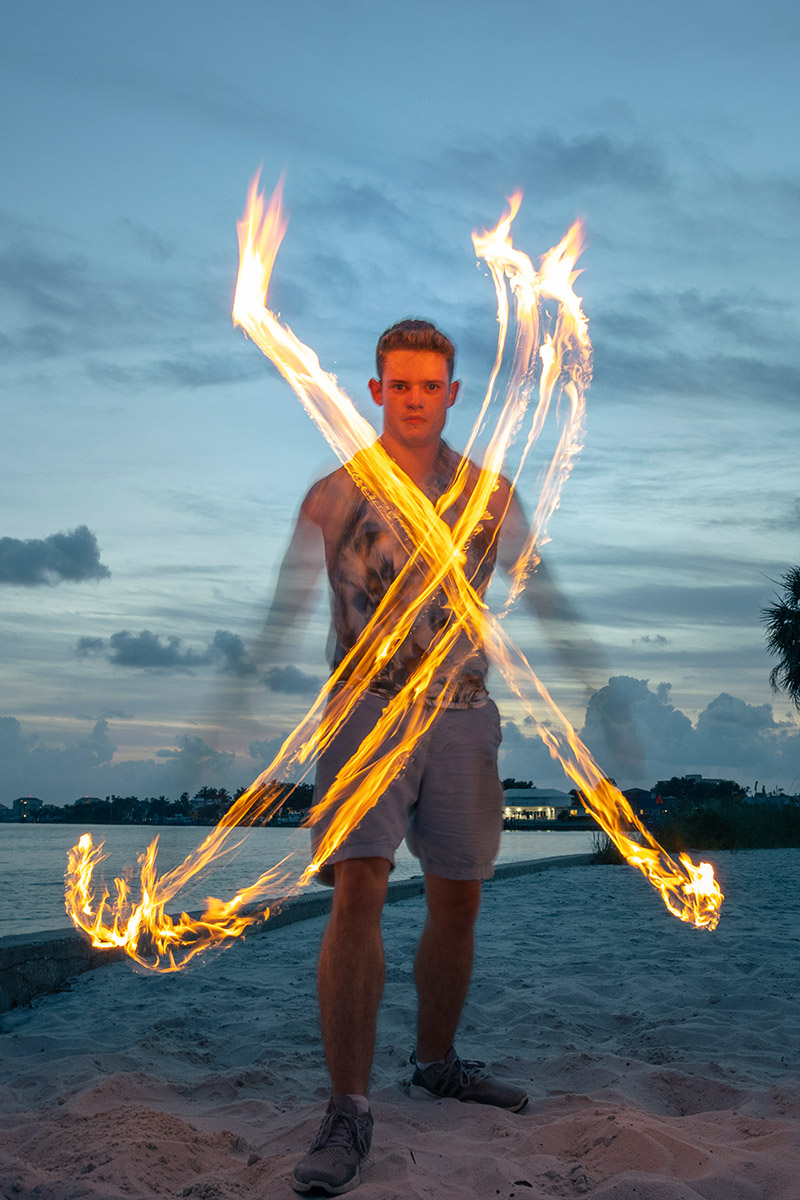Aidan Webster strode onto the sand of Eckerd College’s South Beach and turned to face an audience of several dozen people eager to see if he could really do it. Wearing shorts, a flowered shirt and the look of a gathering storm, he checked twice to make sure the counters, witnesses and videographers were all in place and ready. When you’re trying to break three Guinness World Records, all within one hour, those people are crucial.
After a brief warmup, he began to juggle three rubber balls. The crowd inched closer. “This is the most difficult record for me to break,” he said to the group. And then he grinned. “I’m trying to build suspense.”
A half hour earlier inside the McArthur Physical Education Center, Aidan, a rising junior marine science student from Trappe, Pennsylvania, had broken the world record for one-handed juggling while hanging by one arm from a bar. Now, on a warm mid-July evening, he would attempt to break the world record for most consecutive backflips in one minute while juggling three balls. The record was eight flips.
Someone with a stopwatch shouted, “Go!”—and with only a few seconds between attempts, Aidan reeled off one backflip after another. He completed 11 before time ran out. “That’s two down,” he said, trying to catch his breath. “Let’s go set up the fire.”
Give him a challenge, and he’s on board. This year, Aidan spent his Winter Term in Belize studying marine ecology. In the spring, he was part of Eckerd’s Scientist at Sea program in the Gulf of Mexico. This summer, he is conducting chemical oceanography research in the lab of Patrick Schwing ’06, Ph.D., assistant professor of marine science.
He is currently examining microbes left behind by the 2010 Deepwater Horizon oil spill off the Louisiana coast. Before it was capped, the drill site spewed about 134 million gallons of oil into the Gulf of Mexico. “We are looking at the density and diversity of benthic foraminifera over time and over area to judge the recovery of the Gulf from the spill,” Aidan explains.
On Saturdays, he works at the Gulfport Dive Center as a retail associate.
His passion for tossing multiple objects into the air, catching them, and returning them to the air began when he was about 7. His father taught him the basic three-ball juggle, and from there, he used YouTube videos to expand his repertoire.
It also helps that he was a gymnast, and that his parents provided unlimited support. “My parents made it clear to me that I could do anything I put my mind to,” he says. “Juggling is interesting and entertaining, and I think you engage a part of your brain you only use when you’re doing something like playing sports.
“About a year and a half ago, I was in a spot where a lot of what I was doing didn’t have a purpose to it,” he adds. “So I asked myself, ‘What can I do that I have the talent for?’ I knew I was a decent juggler, so I started looking through the Guinness records to see what I might have a chance of beating. I applied for three records, and honestly, I didn’t think I could beat all three.”
Several months ago, he began practicing two or three hours a day. “Certain muscles in my arms started cramping up on me,” he recalls. “I was having a lot of soreness. But it’s kind of addicting. I kept telling myself the more I practice, the closer I’ll get to succeeding. And I had a lot of support from my friends. A lot of the prep wasn’t just juggling; it was the due diligence and the paperwork you have to do for Guinness. They’re very picky.”
Now it was time to try to break the third record—juggling three flaming torches for longer than three minutes and 55 seconds. As the sun slipped down beyond Boca Ciega Bay, Aidan lit the torches and tossed them rotating into the dusk. “I could do this for hours,” he said about two minutes in.
And maybe he could have. But the flame on one of the torches went out, immediately stopping the clock. Even so, he smashed the previous record by more than a minute. His time was five minutes and two seconds. “That was tough,” he admitted. “The fuel [from the torches] kept getting into my eyes.”
What does he gain from breaking the records? Guinness doesn’t offer monetary rewards—just certificates authenticating the feats. “You can tell someone you’re hardworking and motivated, but that doesn’t mean much unless you can show it,” Aidan explains. “Juggling isn’t what I take most seriously in my life, but it’s nice to be able to say I got these records because of a lot of hard work.”
And there’s that matter of a higher calling. Aidan plans to attend graduate school and continue his work in the marine science field. Schwing says that along with the Gulf of Mexico research, Aidan is helping survey an area in the Pacific Ocean where deep-sea mineral mining could take place. “We’re trying to help provide information about the chemical, geological and biological processes going on there,” Schwing explains.
“Aidan is very enthusiastic. He picks things up very quickly.”














